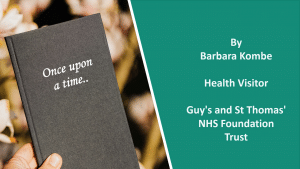19th October 2020
A Voices blog by Barbara Kombe, Health Visitor at Evelina London, Guys and St Thomas NHS Trust, on the babies born during the current pandemic.

So far, over 76,000 babies have been born in England during the pandemic. Whilst babies can’t speak about their experiences, there is an existing body of evidence that indicates that babies’ early experiences shape who they are and contribute to their health and wellbeing. Sadly, we know that many babies will be impacted by their experiences of parental stress, fear and other human emotions associated with lockdown and the secondary impacts of the pandemic. It is, therefore, my role as a health visitor to be an advocate for children’s thoughts and feelings and to try and represent their “voice”. The two known pieces of legislation that govern why the voice of the child is paramount are the UN Convention on the Rights of a child (1989) and the Children’s Act 2004.
Inspired by Tom Foolery, my interactions with new parents and their babies during the pandemic led me to find a way to convey a sense of what their life was like as the events unfolded. I have tried to capture their experiences into a short film, as part of the ‘Making History’ project for the Institute of Health Visiting, as a story told to a child.
It is hoped that the short film will be the story that children watch and reflect on for years to come, to understand some of their early childhood experiences.
During the pandemic, I have been concerned that the plight of children has been overshadowed by the Government and media spotlight being mostly on adult deaths and efforts to reduce the rampant spread of COVID -19 amongst the community. Little attention has been given to babies and young children – did most people assume they were unaffected?
It is also important to reflect on children and babies who, during the pandemic, have been in households where home was not a “safe place” – with perpetrators of domestic violence, parents suffering with mental health problems, children with complex health needs, autism or special educational needs.
What is their story – where is their voice? And what will the impact on their mental wellbeing be?
And, with the passing of time, will we come to view the pandemic as an adverse childhood experience? It will depend on whether we start to address the needs of babies and children now and attune to the child’s voice.
Health visitors remained the frontline workers in the community for babies and new parents during COVID-19, supporting them where their usual support networks of family and friends were unavailable. Providing a universal “safety-net” for babies and young children through their work with all families, health visitors are best placed to promote the physical and mental health and wellbeing of all infants, and identify vulnerable babies at the earliest opportunity to ensure that they get the support that they need.
I am very excited about the recent announcement of a review led by Rt Hon Andrea Leadsom MP on health and development outcomes of babies and children in England, looking at the experiences of care that families received during COVID-19 pandemic. This means the government is listening, it is up to Health visitors to continue to drive policy change as frontline workers in the community and ensure that the voice for babies and young children is heard.
Watch Barbara’s video below:






